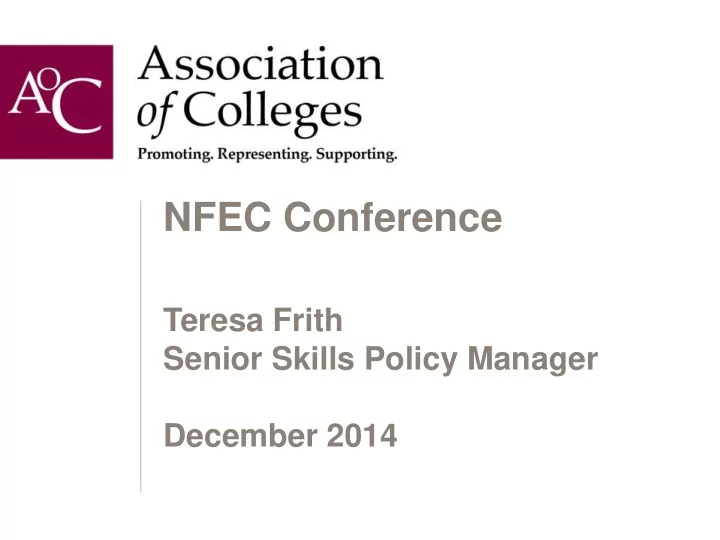

NFEC Conference Teresa Frith Senior Skills Policy Manager December 2014
A New Agenda? Learner Driven – customers/consumers (directly and indirectly), loans, personalised programmes, technology Higher Standards – curriculum design and assessment, accountability Institutional autonomy balanced with accountability - to parents, students, locality, holders of the public purse Employer Led - sponsoring institutions, designing standards and assessment strategies, endorsing qualifications, receiving public funds, exerting influence locally (LEP) All within the context of : Austerity – rebalancing who pays for what and why
Study Programmes Ofsted publication : Transforming 16 to 19 education and training: the early implementation of 16 to 19 Study Programmes (September 2014) Series of recommendations: • Careers advice • Senior Leader should be accountable for Study Programmes and Governors should hold leaders to account for implementation of Study Programmes • Complete a full curriculum review – progression routes • Ensure individualised programmes
Study Programmes Continued • Level 1 programmes – work experience and work preparation a core aim, English and maths and progression • Levels 2 and 3 – sufficient and suitable work related activity and work experience • Clear policies and procedures concerning English and maths • Traineeships
The Inspection Process: Further Education and Skills Ofsted consultation closes 5 December 2014 • Implementation 2015/16 • Common framework: early years, schools, FE and Skills • Short inspections of ‘good’ providers every three years • Greater emphasis upon safeguarding, suitability of the curriculum, preparation for life and work in Britain today including personal development, welfare and behaviour • Separate grade for personal development, behaviour and welfare • Types of provision rather than subjects • Lesson observations – to be graded or not?
The Review Process : Higher Education QAA conducting a Higher Education Review • The setting and/or maintenance of academic standards • The provision of learning opportunities • The provision of information • The enhancement of the quality of students' learning opportunities ….. And the development of a new quality assessment process
Technology Further Education Learning Technology Advisory Group (FELTAG) Government response to recommendations June 2014 • Learners • Employers/LEPs and colleges working together to support emerging digital technologies • Developing the workforce – including Governing Bodies • 2014/15 field in ILR to capture information • 2015/16 on-line only funding route • Learning Futures – innovations in the use of learning technology • Today: digital colleges publication
Employer Led Apprenticeships • 111 standards developed/in development • Significant numbers at L3 and above • Majority have professional body recognition • English and maths requirements set out • Trailblazer funding rules published and each standard ascribed to a Core Government Contribution Cap • Employers and training providers agree a price for training and assessment
Funding 2014/15 • Co-investment for purchasing training and assessment – employers agree a price for delivery • For every one third that an employer invests in training an apprentice, the Government will pay two thirds up to a clear cap set for each standard. • English and maths (Level 1 & 2) will be fully funded and additional learning support is available as needed. • Employer Incentive Payments will be made to support key groups for eligible employers and apprentices during the first year for 16-18 year old - 50% at 3 months and 50% at 12 months • For small businesses – 100% at 3 months • For completion - at the end of the Apprenticeship • Incentives can be used as each employer choses
14/15 Funding Model for Trailblazers Maximum Core Cap 1 Cap 2 Cap 3 Cap 4 Cap 5 Government contribution (£2 for every £1 from £2,000 £3,000 £6,000 £8,000 £18,000 employer) Employer contribution if the maximum cap is £1000 £1,500 £3,000 £4,000 £9,000 claimed Additional Recruiting a incentive 16-18 year £600 £900 £1,800 £2,400 £5,400 payments old For a small business £500 £500 £900 £1,200 £2,700 (<50) For successful £500 £500 £900 £1,200 £2,700 completion Maximum total £3,600 £4,900 £9,600 £12,800 £28,800 Government contribution
Questions?
Recommend
More recommend